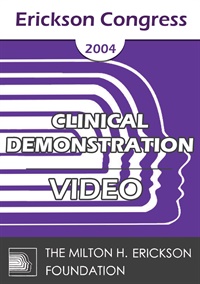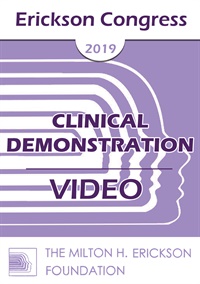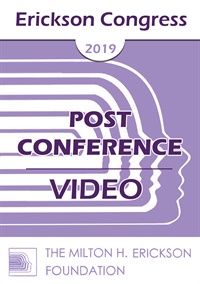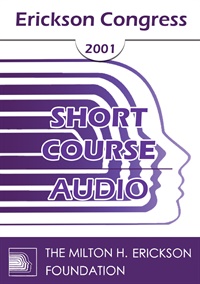
- Average Rating:
- Not yet rated
- Topic Areas:
- Short Courses | Children and Adolescent Therapy | Ericksonian Psychotherapy | Psychotherapy
- Categories:
- Erickson Congress | Erickson Congress 2001
- Faculty:
- Maria Escalante de Smith, MA
- Duration:
- 58:26
- Format:
- Audio Only
- Original Program Date:
- Dec 06, 2001
- Short Description:
- IC01 Short Course 29 - Using Ericksonian Psychotherapy with "Special Children" - Maria C. Escalante, MA, DDS
- Price:
- $15.00 - Base Price
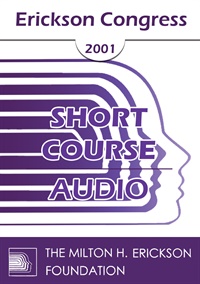
- Average Rating:
- Not yet rated
- Topic Areas:
- Short Courses | Ericksonian Psychotherapy | Psychotherapy | Language of Hypnosis
- Categories:
- Erickson Congress 2001 | Erickson Congress
- Faculty:
- Blanca Iris Corzo, MA
- Duration:
- 56:51
- Format:
- Audio Only
- Original Program Date:
- Dec 06, 2001
- Short Description:
- IC01 Short Course 37 - Integrating Two Psychotherapy Approaches with Different Philosophical Positions: Ericksonian Psychotherapy and Collaborative Language - Blanca Iris Corzo, MA As an Ericksonian psychotherapist, how do I open up a space to new frameworks that propose different and even opposite ideas, such as Ericksonian Psychotherapy and Collaborative Language? A general review of the main points that define both approaches will be done in order to know the differences and similarities of both approaches. This course is aimed at inviting these two positions to co-exist effectively during the psychotherapeutic process.
- Price:
- $15.00 - Base Price
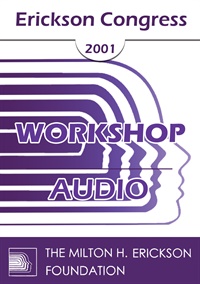
- Average Rating:
- Not yet rated
- Topic Areas:
- Workshops | Logotherapy | Reframing | Ericksonian Psychotherapy
- Categories:
- Erickson Congress 2001 | Erickson Congress
- Faculty:
- Steve Andreas, MA, NLP
- Duration:
- 2:33:17
- Format:
- Audio Only
- Original Program Date:
- Dec 07, 2001
- Short Description:
- This workshop looks at how meaning gets constructed and how small shifts in context or interpretation can change an emotional response entirely. Through live examples and experiential work, it shows how reframing can loosen rigid beliefs, soften self-judgment, and open new choices without arguing with the client’s experience.
- Price:
- $15.00 - Base Price
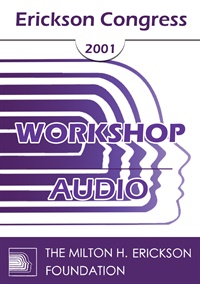
- Average Rating:
- Not yet rated
- Topic Areas:
- Workshops | Ericksonian Hypnosis and Therapy Techniques | Ericksonian Psychotherapy | Future Oriented
- Categories:
- Erickson Congress | Erickson Congress 2001
- Faculty:
- Brian Alman, PhD
- Duration:
- 2:09:46
- Format:
- Audio Only
- Original Program Date:
- Dec 07, 2001
- Short Description:
- This workshop looks at how Ericksonian principles can evolve with new technology, showing how personalized phone-based follow up, self hypnosis and everyday micro interventions help people carry therapeutic change into real life. Participants hear practical ways to extend rapport, strengthen self care and support long term improvement beyond the consulting room.
- Price:
- $15.00 - Base Price
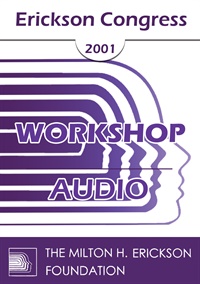
- Average Rating:
- Not yet rated
- Topic Areas:
- Workshops | Ericksonian Psychotherapy | Psychotherapy
- Categories:
- Erickson Congress | Erickson Congress 2001
- Faculty:
- Ernest Rossi, PhD
- Duration:
- 1:17:58
- Format:
- Audio Only
- Original Program Date:
- Dec 08, 2001
- Short Description:
- IC01 Workshop 39 - Facilitation of Gene Expression and Neurogenesis in Ericksonian Psychotherapy - Ernest Rossi, PhD
- Price:
- $15.00 - Base Price
- Average Rating:
- Not yet rated
- Topic Areas:
- Clinical Demonstrations | Dreamwork | Ericksonian Psychotherapy | Neuroscience
- Categories:
- Erickson Congress | Erickson Congress 2004
- Faculty:
- Ernest Rossi, PhD
- Course Levels:
- Master Degree or Higher in Health-Related Field
- Duration:
- 54:52
- Format:
- Audio and Video
- Original Program Date:
- Dec 03, 2004
- Short Description:
- To list three psychological experiences that facilitate gene expression and brain plasticity. To describe how to engage the creative dynamics of dream work in Ericksonian psychotherapy.
- Price:
-
Sale is $29.00
price reduced from Base Price - $59.00
Tags: Dreams Neuroscience
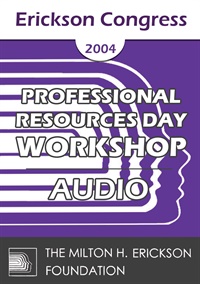
- Average Rating:
- Not yet rated
- Topic Areas:
- Workshops | Ericksonian Psychotherapy | Meditation, Spirituality and Yoga | Pain and Healing
- Categories:
- Erickson Congress | Erickson Congress 2004
- Faculty:
- Carl Hammerschlag, MD
- Duration:
- 1:56:04
- Format:
- Audio Only
- Original Program Date:
- Dec 01, 2004
- Short Description:
- Ericksonian psychotherapists understand the importance of stories, symbols, and the use of sacred objects in their healing work. We use them to create strategic interventions that help patients move beyond their limitations. In this workshop we will learn how to incorporate all of these elements in the creation of healing ceremonies.
- Price:
- $15.00 - Base Price

- Average Rating:
- Not yet rated
- Topic Areas:
- Workshops | Therapist Development | Ericksonian Psychotherapy
- Categories:
- Erickson Congress | Erickson Congress 2004
- Faculty:
- Steve Andreas, MA, NLP
- Duration:
- 2:01:27
- Format:
- Audio Only
- Original Program Date:
- Dec 01, 2004
- Short Description:
- This workshop explores humility as a practical psychological skill rather than a moral ideal. Using experiential exercises and precise modeling of self-concept, it examines how pride, shame, comparison, and self-judgment shape inner stability, and how integrating counterexamples can strengthen identity, flexibility, and freedom of choice in both personal and clinical work.
- Price:
- $15.00 - Base Price
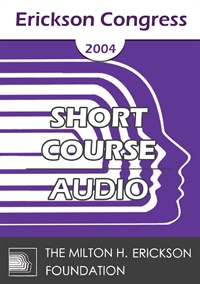
- Average Rating:
- Not yet rated
- Topic Areas:
- Short Courses | Ericksonian Psychotherapy | Interspersal | Tailoring | Utilization | Art and Creativity | Trance | Ericksonian Hypnosis and Therapy Techniques | Music
- Categories:
- Erickson Congress | Erickson Congress 2004
- Faculty:
- Maria Escalante de Smith, MA
- Duration:
- 1:18:14
- Format:
- Audio Only
- Original Program Date:
- Dec 02, 2004
- Short Description:
- Ericksonian psychotherapy emphasizes the importance of tailoring. In this workshop, we will learn how to utilize sung trances where the client's own vocabulary, interspersal and future orientation will be used. Brief interventions will be presented while using sung trances and participants will learn how to compose their own interventions using music and hypnotic language. Audience participation will be invited.
- Price:
- $15.00 - Base Price

- Average Rating:
- Not yet rated
- Topic Areas:
- Short Courses | Children and Adolescent Therapy | Ericksonian Hypnosis and Therapy Techniques | Ericksonian Psychotherapy | Psychotherapy | Utilization | Tailoring
- Categories:
- Erickson Congress | Erickson Congress 2007
- Faculty:
- Maria Escalante de Smith, MA
- Duration:
- 1:18:55
- Format:
- Audio Only
- Original Program Date:
- Dec 07, 2007
- Short Description:
- Ericksonian psychotherapy emphasizes the utilization of our resources. When I treat children with enuresis, I focus on resources and keep in mind that Ericksonian interventions should be brief because children may get tired of being in therapy for too long. Techniques tailored to a child and examples of inductions such as eye fixation utilizing toys will be presented. I will emphasize how to make several brief interventions quickly while utilizing "non human co-therapists" during home assignments, and the combination of conversational trance with tasks.
- Price:
- $15.00 - Base Price

- Average Rating:
- Not yet rated
- Topic Areas:
- Short Courses | Ericksonian Hypnosis and Therapy Techniques | Ericksonian Psychotherapy | Hypnosis | Psychotherapy
- Categories:
- Erickson Congress | Erickson Congress 2007
- Faculty:
- Harvey Wasserman, MD | Sarah Daniel, MED | Michael Mullally, MA
- Duration:
- 1:14:57
- Format:
- Audio Only
- Original Program Date:
- Dec 07, 2007
- Short Description:
- Homeopathic remedies can be comfortably and effectively used as an adjunct to Ericksonian hypnosis and psychotherapy. When a correct match is found between the client's emotional and psychological state and the remedy is offered, the client frequently enters an altered state of consciousness or trance which facilitates profound and lasting change. Dr. Wasserman will demonstrate his trance-following technique induced by deeply resonant homeopathic remedies, and will introduce the use of remedies through live demonstrations and clinical examples.
- Price:
- $15.00 - Base Price
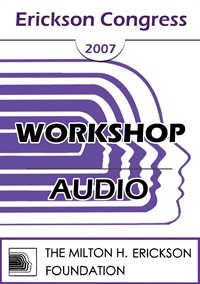
- Average Rating:
- Not yet rated
- Topic Areas:
- Workshops | Utilization | Ericksonian Psychotherapy | Psychotherapy
- Categories:
- Erickson Congress | Erickson Congress 2007
- Faculty:
- Brent Geary, PhD
- Duration:
- 1:27:02
- Format:
- Audio Only
- Original Program Date:
- Dec 09, 2007
- Short Description:
- Values are exceedingly important dynamics in human motivation and behavioral choice. this workshop explores systemic ways in which values can be considered and incorporated into both hypnotic and non-hypnotic treatment. Participants will complete a values survey to assist in self-awareness.
- Price:
- $15.00 - Base Price
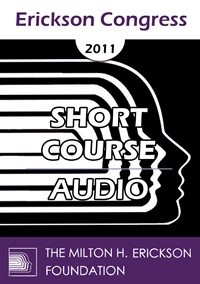
- Average Rating:
- Not yet rated
- Topic Areas:
- Ericksonian Psychotherapy | Psychotherapy | Short Courses | Ericksonian Hypnosis and Therapy Techniques | Art and Creativity | Unconscious Processes
- Categories:
- Erickson Congress | Erickson Congress 2011
- Faculty:
- Daniel Bass
- Duration:
- 56:11
- Format:
- Audio Only
- Original Program Date:
- Dec 09, 2011
- Short Description:
- Movies are complex multi-sensory stories reflecting a specific world, transporting messages and solutions in order to provide the viewer with the possibility of identifying with the movie characters. Viewers get absorbed in movies and empathize, recognize consciously or subconsciously one’s own central topics in life. They provide the possibility of being catalysts for developmental processes that can be used in psycho-therapy. In this presentation participants will learn about the processes of watching movies and the trans-fer into therapy.
- Price:
- $15.00 - Base Price
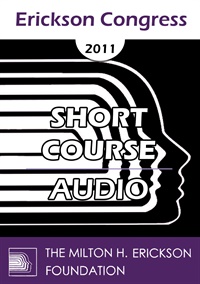
- Average Rating:
- Not yet rated
- Topic Areas:
- Ericksonian Psychotherapy | Psychotherapy | Short Courses | Ericksonian Hypnosis and Therapy Techniques | Femininity
- Categories:
- Erickson Congress | Erickson Congress 2011
- Faculty:
- Maria Escalante de Smith, MA
- Duration:
- 1:22:02
- Format:
- Audio Only
- Original Program Date:
- Dec 09, 2011
- Short Description:
- When women face unexpected pregnancies, they may experience a variety of feelings. Ericksonian techniques can help them consider alternatives. Short crises interventions such as future rehearsal and utilization will also be discussed as Ericksonian tools to be used during single session therapy. Participants will be able to discuss different alternatives such as adoption and ways to help keep their baby will be promoted. Age regression for coping with post-abortion syndrome will be described.
- Price:
- $15.00 - Base Price
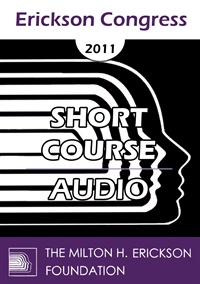
- Average Rating:
- Not yet rated
- Topic Areas:
- Short Courses | Ericksonian Hypnosis and Therapy Techniques | Ericksonian Psychotherapy | Hypnosis | Psychotherapy | Dissociation
- Categories:
- Erickson Congress | Erickson Congress 2011
- Faculty:
- Pantazis Iordanidis, MD, PhD
- Duration:
- 1:21:25
- Format:
- Audio Only
- Original Program Date:
- Dec 09, 2011
- Short Description:
- Pathological gambling is an impulse control disorder characterized by persistent and recurrent maladaptive gambling behavior. Hypnotic phenomena of absorption, dissociation and imaginative involvement seem to play a significant role in the persistence of gambling behavior. These capacities of the client can be utilized in effective treatment, using hypnosis.
- Price:
- $15.00 - Base Price
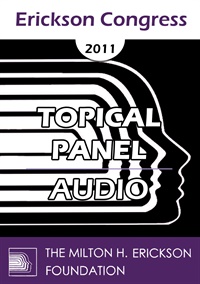
- Average Rating:
- Not yet rated
- Topic Areas:
- Hypnosis | Topical Panels | Mind-Body | Creativity in Therapy | Ericksonian Psychotherapy | Stress
- Categories:
- Erickson Congress | Erickson Congress 2011
- Faculty:
- Helen Adrienne, LCSW, BCD | Helen Erickson, PhD, MSN, AHN-BC, FAAN, SGAHN | Gary Ruelas, DO, PhD | Ernest Rossi, PhD
- Duration:
- 59 Minutes
- Format:
- Audio Only
- Original Program Date:
- Dec 07, 2011
- Short Description:
- This panel brings together clinicians and researchers to explore how mind, body and spirit interact through hypnosis, creativity and neurobiology. Speakers illustrate how imagery, stress reduction, and trance can calm the nervous system, support medical treatments, and restore a client’s sense of agency. They also discuss emerging research on gene expression, ultradian rhythms and the creative process, offering a hopeful vision of hypnosis as a bridge between biology, meaning and the human drive to heal.
- Price:
- $20.00 - Base Price
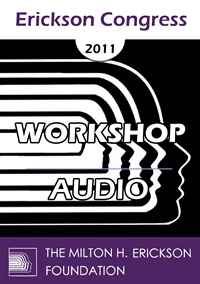
- Average Rating:
- Not yet rated
- Topic Areas:
- Hypnosis | Psychotherapy | Workshops | Ericksonian Hypnosis and Therapy Techniques | Ericksonian Psychotherapy | Pain and Healing | Metaphors
- Categories:
- Erickson Congress | Erickson Congress 2011
- Faculty:
- Teresa Garcia-Sanchez, MA
- Duration:
- 59 Minutes
- Format:
- Audio Only
- Original Program Date:
- Dec 07, 2011
- Short Description:
- Ericksonian psychotherapy and hypnosis treatment (done in conjunction with the latest advances in medicine) of a multiple sclerosis (MS) case will be reported. Ten years later, medical reports show 95% recovery based on the evidence of the scanned images that will be presented as well as patient’s feed-back videos and a full description of the development of the illness and treatment.
- Price:
- $20.00 - Base Price
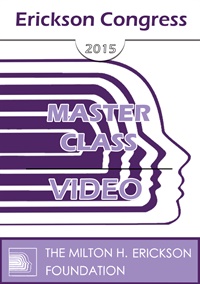
- Average Rating:
- Not yet rated
- Topic Areas:
- Ericksonian Psychotherapy | Psychotherapy | Master Classes | Brief Therapy | Ericksonian Hypnosis and Therapy Techniques | Self-Relations | Experiential Therapy | Hypnosis
- Categories:
- Erickson Congress | Erickson Congress 2015 | Master Class
- Faculty:
- Jeffrey Zeig, PhD | Stephen Gilligan, PhD
- Course Levels:
- Master Degree or Higher in Health-Related Field
- Duration:
- 5 Hours 9 Minutes
- Format:
- Audio and Video
- Original Program Date:
- Dec 13, 2015
- Short Description:
- Ericksonian hypnotherapy and the Self-Relations approach are experiential methods of change. In combination they can be synergistic. Psychotherapy is best when clients have a first-hand experience of an alive therapeutic process. Such dynamic empowering experiences pave the way for dynamic understandings. Drs. Gilligan and Zeig will engage with each other and the participants to examine commonalities and differences in their work.
- Price:
- $99.99 - Base Price
- Average Rating:
- Not yet rated
- Topic Areas:
- Clinical Demonstrations | Ericksonian Psychotherapy | Psychotherapy | Dissociation | Trance
- Categories:
- Erickson Congress | Erickson Congress 2019
- Faculty:
- Teresa Robles, MA, PhD
- Course Levels:
- Master Degree or Higher in Health-Related Field
- Duration:
- 1 Hour 3 Minutes
- Format:
- Audio and Video
- Original Program Date:
- Dec 14, 2019
- Short Description:
- In this demonstration I will present how to introduce to the client the concept of Universal Wisdom and how to utilize it during the session. We are going to work with the minimum information about the problem because we are going to work with what I call Universal Topics that underly the problem. The problem will be treated with several different mini trances that trigger processes that will continue in the hands of Universal Wisdom.
- Price:
-
Sale is $29.00
price reduced from Base Price - $59.00
Tags: Dissociation Trance
- Average Rating:
- Not yet rated
- Topic Areas:
- Master Classes | Ericksonian Psychotherapy | Psychotherapy | Brief Therapy | Hypnotherapy | Self-Relations | Utilization
- Categories:
- Erickson Congress | Erickson Congress 2019
- Faculty:
- Bill O'Hanlon, MS | Jeffrey Zeig, PhD
- Course Levels:
- Master Degree or Higher in Health-Related Field
- Duration:
- 4 Hours 49 Minutes
- Format:
- Audio and Video
- Original Program Date:
- Dec 16, 2019
- Short Description:
- Ericksonian hypnotherapy and the Self-Relations approach are experiential methods of change. In combination they can be synergistic. Psychotherapy is best when clients have a first-hand experience of an alive therapeutic process. Such dynamic empowering experiences pave the way for dynamic understandings. Bill O’Hanlon and Jeffrey Zeig will engage with each other and the participants to examine commonalities and differences in their work.
- Price:
- $59.00 - Base Price
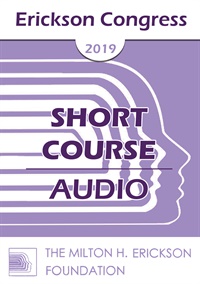
- Average Rating:
- Not yet rated
- Topic Areas:
- Short Courses | Children and Adolescent Therapy | Ericksonian Psychotherapy | Psychotherapy | Ericksonian Hypnosis and Therapy Techniques | Family Therapy
- Categories:
- Erickson Congress | Erickson Congress 2019
- Faculty:
- Maria Escalante de Smith, MA
- Duration:
- 1 Hour
- Format:
- Audio Only
- Original Program Date:
- Dec 12, 2019
- Short Description:
- Ericksonian Psychotherapy emphasizes the importance of utilization. When treating children, as therapists, we need to keep in mind that we also need to utilize whatever happens during therapy whether that can be a given behavior, if the child brings a toy for the consultation, their likes and also provide them with a wide array of resources they can access during therapy.
- Price:
- $15.00 - Base Price
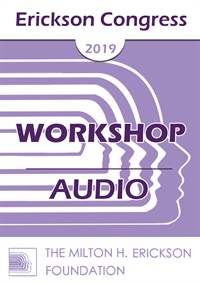
- Average Rating:
- Not yet rated
- Topic Areas:
- Workshops | Grief | Ericksonian Hypnosis and Therapy Techniques | Ericksonian Psychotherapy | Hypnosis | Psychotherapy | Aging and Mortality
- Categories:
- Erickson Congress | Erickson Congress 2019
- Faculty:
- Teresa Garcia-Sanchez, MA
- Duration:
- 1 hour 46 minutes
- Format:
- Audio Only
- Original Program Date:
- Dec 15, 2019
- Short Description:
- Loved ones leave us, couples and friends separate, we suffer physical changes as we grow up during adolescence and as we grow old, work changes happen, as well as our mood, which evolves throughout our lives.
- Price:
- $15.00 - Base Price
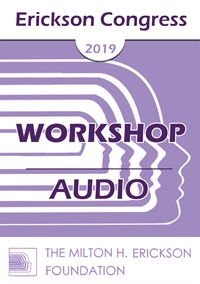
- Average Rating:
- Not yet rated
- Topic Areas:
- Workshops | Ericksonian Psychotherapy | Psychotherapy | Ericksonian Hypnosis and Therapy Techniques | Unconscious Processes
- Categories:
- Erickson Congress | Erickson Congress 2019
- Faculty:
- Teresa Robles, MA, PhD
- Duration:
- 1 Hour 30 Minutes
- Format:
- Audio Only
- Original Program Date:
- Dec 15, 2019
- Short Description:
- Dr. Erickson proposed that all our life experiences were learnings and resources registered in our Unconscious Mind. He considered Unconscious Mind as a Wise Part. For Quantum Physics in the same way that all the information about each person is in its DNA, the information of the Whole Universe is present in each one of its parts. I call that information our Universal Wisdom. Wisdom, because it is all the information and Universal because it is the same everywhere. For me Universal Wisdom is the Creative Force, and so, Almighty. That is not a question of beliefs but a question of imagining. What we imagine for our brain is stronger than what it recognizes as reality.
- Price:
- $15.00 - Base Price
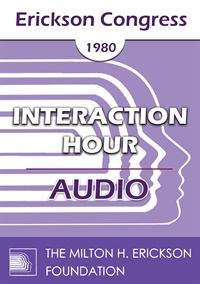
- Average Rating:
- Not yet rated
- Topic Areas:
- Interaction Hours | Psychotherapy | Hypnotherapy | Ericksonian Hypnosis and Therapy Techniques | Ericksonian Psychotherapy | Milton Erickson
- Categories:
- Erickson Congress | Erickson Congress 1980 | Pioneers in Couples and Family Therapy
- Faculty:
- Jay Haley, MA | Carl Whitaker, MD | Ernest Rossi, PhD
- Duration:
- 45:41
- Format:
- Audio Only
- Original Program Date:
- Dec 06, 1980
- Short Description:
- During this Interaction Hour, Carl Whitaker and Jay Haley explore Milton H. Erickson’s creative therapeutic methods, including ideomotor action and sensory recall. Their session also examines Erickson's self-healing, the challenge of emulation, and the role of adversity in innovation.
- Price:
- $15.00 - Base Price
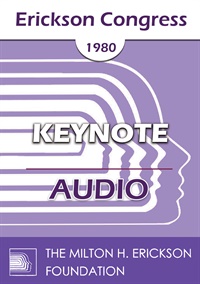
- Average Rating:
- Not yet rated
- Topic Areas:
- Keynotes | Psychotherapy | Ericksonian Hypnosis and Therapy Techniques | Ericksonian Psychotherapy | Hypnotherapy | Milton Erickson
- Categories:
- Erickson Congress 1980 | Erickson Congress | Pioneers in Couples and Family Therapy
- Faculty:
- Jay Haley, MA
- Duration:
- 1:01:07
- Format:
- Audio Only
- Original Program Date:
- Dec 05, 1980
- Short Description:
- Jay Haley reflects on his personal experiences with Milton Erickson, offering insight into Erickson’s distinctive use of metaphor, indirect communication, and strategic symptom management. He highlights Erickson’s focus on brief, practical therapy, family involvement, and adaptability to each client’s needs. The talk underscores Erickson’s lasting influence on modern psychotherapy and his pragmatic, often unconventional approach.
- Price:
- $15.00 - Base Price


